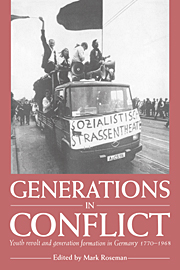Book contents
- Frontmatter
- Contents
- Contributors
- Acknowledgements
- List of abbreviations
- 1 Introduction: generation conflict and German history 1770–1968
- 2 The ideal of youth in late eighteenth-century Germany
- 3 Young Germans and Young Germany: some remarks on the history of German youth in the late eighteenth and in the first half of the nineteenth century
- 4 The battle for the young: mobilising young people in Wilhelmine Germany
- 5 Jewish politics and generational change in Wilhelmine Germany
- 6 The ‘front generation’ and the politics of Weimar Germany
- 7 The New Woman and generation conflict: perceptions of young women's sexual mores in the Weimar Republic
- 8 Generations of German historians: patronage, censorship and the containment of generation conflict 1918–1945
- 9 Gender, generation and politics: young Protestant women in the final years of the Weimar Republic
- 10 The Hitler Youth generation and its role in the two post-war German states
- 11 The BDM generation: a female generation in transition from dictatorship to democracy
- 12 A generation twice betrayed: youth policy in the transition from the Third Reich to the Soviet Zone of Occupation (1945–1946)
- 13 The generation conflict that never was: young labour in the Ruhr mining industry 1945–1957
- 14 The German Kriegskinder: origins and impact of the generation of 1968
- Index
9 - Gender, generation and politics: young Protestant women in the final years of the Weimar Republic
Published online by Cambridge University Press: 19 October 2009
- Frontmatter
- Contents
- Contributors
- Acknowledgements
- List of abbreviations
- 1 Introduction: generation conflict and German history 1770–1968
- 2 The ideal of youth in late eighteenth-century Germany
- 3 Young Germans and Young Germany: some remarks on the history of German youth in the late eighteenth and in the first half of the nineteenth century
- 4 The battle for the young: mobilising young people in Wilhelmine Germany
- 5 Jewish politics and generational change in Wilhelmine Germany
- 6 The ‘front generation’ and the politics of Weimar Germany
- 7 The New Woman and generation conflict: perceptions of young women's sexual mores in the Weimar Republic
- 8 Generations of German historians: patronage, censorship and the containment of generation conflict 1918–1945
- 9 Gender, generation and politics: young Protestant women in the final years of the Weimar Republic
- 10 The Hitler Youth generation and its role in the two post-war German states
- 11 The BDM generation: a female generation in transition from dictatorship to democracy
- 12 A generation twice betrayed: youth policy in the transition from the Third Reich to the Soviet Zone of Occupation (1945–1946)
- 13 The generation conflict that never was: young labour in the Ruhr mining industry 1945–1957
- 14 The German Kriegskinder: origins and impact of the generation of 1968
- Index
Summary
Generational identity and generational conflict were concepts which exerted a powerful fascination in Weimar Germany. The sharp historical discontinuities since 1914 – the watershed of the Great War, followed by the revolutionary upheavals of the post-war period and later by the Depression – accentuated the contrasts between the formative experiences of one age cohort and those of its immediate predecessor. A leader of young Protestant women observed in 1930 that ‘in all the past centuries there has probably never been a time in which the image of youth has changed so rapidly and with such dramatic contrasts’. By 1932, a contemporary commentator declared that the current generation of adolescents was unable to comprehend the outlook of their immediate elders, let alone understand the world in which their parents and grandparents had grown up.
The sense of belonging to a generation marked by some key experience in adolescence like the outbreak of war, or the ‘hunger winter’ of 1916–17, or the inflation did not inevitably lead to a particular political outlook. But there were ideologues with backgrounds in the youth movement and links to the late Weimar bündische Jugend who were convinced not only that generational divides were crucial in shaping Weimar society, but moreover that a young generation, steeled by its hardships since 1914 and united behind suitable leaders, was destined to play a key role in politics. The ‘generation of the disinherited’ would become the ‘generation of the chosen’. In the final years of the Republic, as has been well documented by research, a rhetoric of generational politics flourished as the collapse of the institutions of Weimar democracy left a growing political vacuum.
- Type
- Chapter
- Information
- Generations in ConflictYouth Revolt and Generation Formation in Germany 1770–1968, pp. 184 - 209Publisher: Cambridge University PressPrint publication year: 1995



